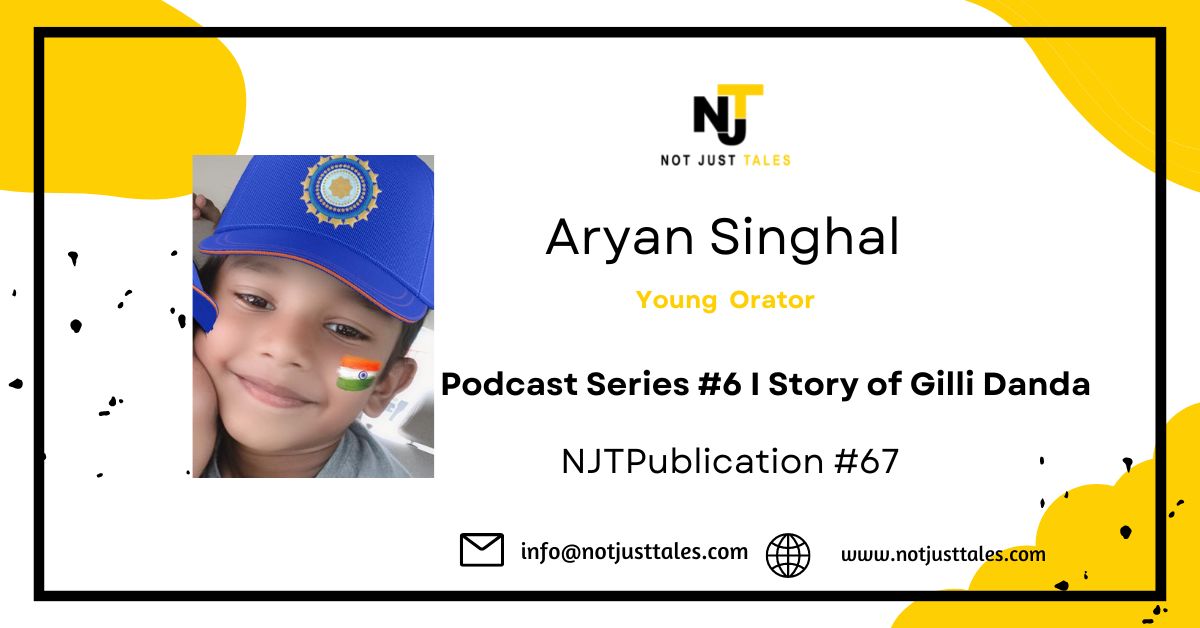Podcast Series #6 I Indian Game Gilli Danda I Student Aryan Singhal I Public Speaking Through Applied Storytelling & Theatre
By admin in Public Speaking through Stories on November 27, 2022
 A short writeup on the indigenous game of India- Gilli Danda, written by our student Aryan Singhal.
A short writeup on the indigenous game of India- Gilli Danda, written by our student Aryan Singhal.
Aryan is 10 years old, a young orator from Gurugram. We are proud to have him as a student of the Little Kathakar Program, an Online Public Speaking through Applied Storytelling & Theatre Program under the mentorship of Trainer Khusshbo Chokhaani. We congratulate Aryan for this exemplary true self-expression.
The Game of Gilli Danda
Have you ever thought of a game in which two sticks are fighting with each other or supporting each other? Hello, everyone. My name is Aryan and today I will be talking about one of the ancient games of India called Gilli Danda.
Gilli Danda” is an ancient sport of India, possibly with origins over 2500 years ago. In India, the origin of Gilli Danda dates back to the period of Mauryan Empire. Historical references suggest that common people played the game on the streets, sometimes being accompanied by members of the royal family. Over time, social stigma made higher social strata to abandon it, making it common man’s game.
India was a vast country with a major portion of South Asia under its belt. But as the geographical boundaries were drawn, India was divided, and new countries came into existence. However, people never lost the fervor for Gilli Danda. The original game spreads from India to its neighboring countries and it came to be known as “Danguli” in Bangladesh, “Dandi-Biyo” in Nepal, “Lappa-Duggi” in Afghanistan and “Kitti-Pullu” in Sri Lanka. Do you know Gilli Danda is a also played in Combodia and Itlay?. Gilli Danda is known by various other names like “Tipcat” in English, “Alak-Doulak” in Persion and many similar names in Indian regional languages. But with different names came different regional rules. Players played as per their own rules and thus, there was no uniform expansion of the game. It continued to remain as an amateur game, only played for entertainment and fun. It was in 2016 that the countries playing Gilli Danda came under the aegis of Gilli Danda International Federation headquartered in Noida in Uttar Pradesh.
“Gilli Danda” is played with two pieces of equipment – a Danda, being a long wooden stick, and a Gilli, a small oval-shaped piece of wood. It is played with four or more players of even numbers. Standing in a small circle, the player balances the Gilli on a stone in an inclined manner with one end of the Gilli touching the ground while the other end is in the air. The player then uses the Danda to hit the Gilli at the raised end, which flips it into the air. While it is in the air, the player strikes the Gilli, hitting it as far as possible. Having struck the Gilli, the player is required to run and touch a pre-agreed point outside the circle before the Gilli is retrieved by an opponent. There is no such official number of players. Gilli Danda can be played individually or between two teams. Gilli Danda is believed to be the origin of Western games such as Cricket, Baseball and Softball.
Gilli Danda also improves the skills like hand and eye co-ordination, judgement, calculation etc. Do you know The Bollywood movie, Lagaan mentions the traditional youth sport of Gilli-Danda as being similar to cricket.
Eminent Hindi writer Premchand wrote a short story named “Gilli-Danda” in which he compares old simple times and emotions to modern values and also hints at caste inequalities in India. The protagonist and narrator of the story recounts his inability to play Gilli-Danda well in his youth. He remembers a friend who could control the Gilli as he wished. He goes away and comes back as an adult and a government officer. He searches for his old friend and finds him – he is very poor and says “Where do we get the time?” when asked by the protagonist whether he plays Gilli-Danda. The protagonist convinces him to play but he cheats at every opportunity, but his friend meekly submits, even though he would not have let him get away with such deceit in his youth. After being defeated, the friend invites him to a Gilli-Danda match the next day.
The protagonist is shocked when he sees his friend play just as well as before and realizes that he had indulged him because he knew that he had forgotten the basics of Gilli-Danda. The protagonist feels very small and goes back to the city humiliated. As an amateur youth sport, Gilli Danda has many regional variations. In some versions, the number of points a striker score depends on the distance the Gilli falls from the striking point. The distance is measured in terms of the length of the Danda, or in some cases the length of the Gilli. Scoring also depends on how many times the Gilli was hit in the air in one strike. If it travels a certain distance with two mid-air strikes, the total points are doubled. If the Gilli is not struck far enough the player has to pick it up and try again.
Shobhit Maurya is the world champion of Gilli Danda with several world records in his name. He is one of the famous Indians in all time of history. The UNESCO Advisory committee and the International Council of Traditional Sports and Games (ICTSG) are keen to revive and promote all such traditional sports which are almost dying in the World. The Advisory committees are a structured way for individual citizens to share their opinions and perspectives, study issues, and develop recommendations in a focused, small group structure. In the end I would like to say that Gilli Danda is one of the best Indian games.
“This was an attempt from my side to share a short glimpse of the Indian game of Gilli Danda. Hope you enjoyed the information.”-Aryan
Leave your valuable comments for encouraging our students to innovate, explore and express more.
